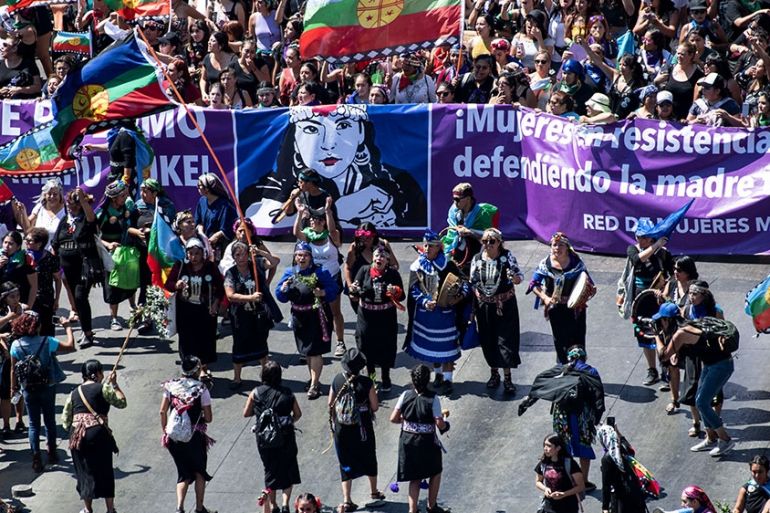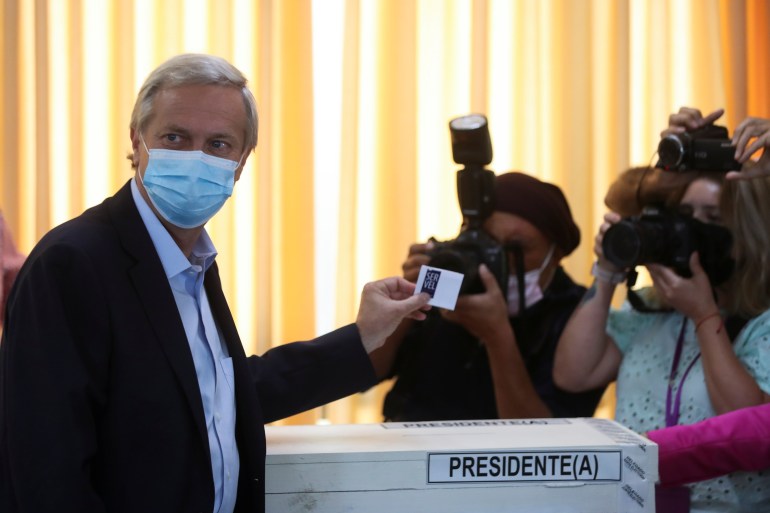Women in Chile voice fears over far-right presidential candidate
As Chile’s presidential runoff nears, some women fear victory for Jose Antonio Kast may roll back their rights.

Santiago, Chile – Olga Valenzuela waits on the side of a busy street in the Chilean capital in the late November heat, wearing a black T-shirt with the name “Muriel” printed on it.
Muriel, Valenzuela’s daughter, was killed four years ago by her boyfriend during an argument in their home. She was 19, and her boyfriend has yet to go to trial or be sentenced.
Keep reading
list of 4 itemsPolitical shake-up on the horizon as Chile to elect new president
Chileans vote for new president to lead transition period
In Pictures: Chile’s Mapuche Gen Z resist police brutality
“I’m not a political person, but I’ve joined this group to be heard,” says Valenzuela, who joined thousands of women in a march on November 25 to Chile’s presidential palace to protest violence against women in the South American nation.
Several mothers walked alongside her, each with names printed on their T-shirts and holding banners to denounce domestic violence. One member of the group carried a suited effigy with a cardboard cutout of the face of far-right presidential candidate, Jose Antonio Kast.
Kast, a 55-year-old devout Catholic and founder of the far-right Republican Party, earned more votes than any other candidate in the first round of Chile’s presidential elections on November 21, securing 27.91 percent support. He will face 35-year-old progressive Gabriel Boric, a former student protest leader, in a December 19 runoff.
For Valenzuela and many of the mothers around her, fears are mounting that a Kast government could cripple their bids for justice and exacerbate the violence that killed their daughters. “No one has listened to me – I’m just one more mother looking for justice,” Valenzuela tells Al Jazeera.
“But I don’t want a Kast government, he is someone that does not support women.
“I won’t have granddaughters,” she adds. “But I want my daughter’s friends to live with respect.”
‘Against the feminist movement’
UN Women has called on Chile to address prevalent gender inequalities, including the low political representation of women in parliament, as well as threats of violence. In 2018, 5.8 percent of Chilean women had reported sexual and/or physical domestic abuse in the previous 12 months, the organisation found.
As part of his campaign, Kast has pledged to curb domestic violence through harsher sentencing for perpetrators.
However, during his 16 years in the Chamber of Deputies, he repeatedly voted against gender equality acts and women’s rights legislation. He has reiterated his beliefs in a patriarchal family unit and Catholic family values, which was condoned as misogynistic and retrogressive by women’s rights activists.
In his presidential programme, Kast announced plans to eliminate the existing Women’s Ministry, which was established in 2017 to eradicate gender inequalities and eliminate violence, and merge it with the social development ministry.
Earlier this week, in a bid to attract the support of women voters, he said he would not eliminate the Women’s Ministry “by name”, but has not retracted his plans to downsize and merge it with the other department.
His programme also includes plans to offer subsidies to heterosexual families with children – excluding single mothers and same-sex couples – and to prohibit abortion under all circumstances, undoing a current rule that allows women to access abortion in the case of rape, danger to the mother’s life, or if the fetus will not survive.
“He has a strategy against the feminist movement and considers that their values are at odds with the concept of a family,” said Paulina Vergara, professor at the Institute of Public Affairs at the University of Chile. “(Women) have such few rights, and without them, we will not have a real democracy,” Vergara told Al Jazeera.
Far-right party
Kast spent the bulk of his career in the Independent Democratic Union (UDI). The party was formed by legislators who held political office during the 17-year dictatorship of Augusto Pinochet, which ended in 1990.
Kast broke from the party in 2016, launching his first campaign for president as an independent candidate a year later, when he came fourth with 7.9 percent of the vote. In 2019, he founded the Republican Party with the support of breakaway members of the UDI who sought a more traditionalist model further aligned with conservative values and libertarian economics.
The party’s manifesto is grounded on the defence of life from “conception to natural death”, a “belief in God”, and the idea that family units involving a man and a woman are “the foundation of society”. It also advocates for low state intervention and a free-market economy.
“The Republican Party’s popularity is part of a shift to the ultra-right that’s happening throughout the world,” said Vergara, citing Poland, Hungary, and Spain as examples. “It has a Christian front, and is more orthodox and more extreme.”
In November’s primaries, Chileans elected 15 deputies from the Republican Party, 12 men and three women. Tweets and interview clips from one elected deputy, Johannes Kaiser, went viral soon after his appointment due to their misogynist and violent nature.
“62% of women fantasize about being raped, and at the same time, they go out and protest, why,” Kaiser tweeted in 2018. In a video published five years ago, he called immigrants “rapists” and questioned whether women should have the right to vote.

Kast condemned Kaiser’s comments, forcing his resignation from the Republican Party only days after he was elected – although Kaiser will keep his position as an independent deputy. Kaiser also apologised for his comments, stressing that he was being sarcastic.
To Vergara, these “jokes” reflect serious ethical flaws within the party. “They make jokes about rape and use arguments based on freedom of speech to defend their views, but it does not make it less violent,” she said.
The Republican Party did not reply to a request for comment from Al Jazeera, neither did the press contact for Kast’s presidential campaign.
But Kast has dismissed accusations of misogyny. “I am the son, husband, and father of tremendous women,” he said in a radio broadcast this week. “I will work tirelessly so that all women live in freedom and tranquillity.”
Women’s vote ‘hugely important’
However, the nature of his programme has alienated many women, including traditionally conservative voters. Natalia Borquez is a 43-year-old dental surgeon who has decided to vote for a left-wing presidential candidate for the first time in her life this month.
“With Kast, we’d lose all our rights,” she told Al Jazeera, explaining that she found aspects of Kast’s programme disturbing, such as eliminating the Women’s Ministry and prohibiting abortion in all circumstances. “Taking it away is to deny these things happen, positioning women once again as second-class citizens,” she said.

Borquez plans to vote for Boric because “she wants her vote to matter”, yet said it was not an easy decision to make. She said some of her conservative-leaning female friends have decided to abstain from the voluntary vote.
In a recent poll, Boric surpassed Kast by 8 percent, placing him in a comfortable lead, while 59 percent of women surveyed said they backed Boric.
Women account for 51 percent of the Chilean electorate, and Vergara said women like Borquez and Valenzuela, who may use their votes to specifically denounce Kast, will be instrumental in deciding the next president.
“In 1988, the women’s vote was hugely important in the vote against the Pinochet regime,” she said. “I hope that this time history will repeat itself.”